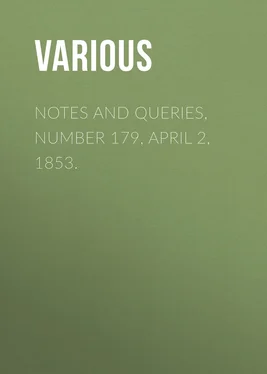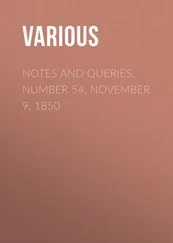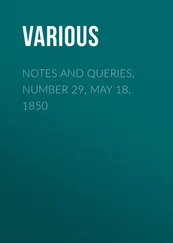Various - Notes and Queries, Number 179, April 2, 1853.
Здесь есть возможность читать онлайн «Various - Notes and Queries, Number 179, April 2, 1853.» — ознакомительный отрывок электронной книги совершенно бесплатно, а после прочтения отрывка купить полную версию. В некоторых случаях можно слушать аудио, скачать через торрент в формате fb2 и присутствует краткое содержание. Жанр: foreign_antique, periodic, foreign_edu, на английском языке. Описание произведения, (предисловие) а так же отзывы посетителей доступны на портале библиотеки ЛибКат.
- Название:Notes and Queries, Number 179, April 2, 1853.
- Автор:
- Жанр:
- Год:неизвестен
- ISBN:нет данных
- Рейтинг книги:5 / 5. Голосов: 1
-
Избранное:Добавить в избранное
- Отзывы:
-
Ваша оценка:
- 100
- 1
- 2
- 3
- 4
- 5
Notes and Queries, Number 179, April 2, 1853.: краткое содержание, описание и аннотация
Предлагаем к чтению аннотацию, описание, краткое содержание или предисловие (зависит от того, что написал сам автор книги «Notes and Queries, Number 179, April 2, 1853.»). Если вы не нашли необходимую информацию о книге — напишите в комментариях, мы постараемся отыскать её.
Notes and Queries, Number 179, April 2, 1853. — читать онлайн ознакомительный отрывок
Ниже представлен текст книги, разбитый по страницам. Система сохранения места последней прочитанной страницы, позволяет с удобством читать онлайн бесплатно книгу «Notes and Queries, Number 179, April 2, 1853.», без необходимости каждый раз заново искать на чём Вы остановились. Поставьте закладку, и сможете в любой момент перейти на страницу, на которой закончили чтение.
Интервал:
Закладка:
WITCHCRAFT IN 1638
I inclose you an extract from an old document in my possession, which appears to be the examination of two witnesses against one Mary Shepherd for witchcraft. The nature of the offence is not specified. Perhaps it may be interesting to some of your readers.
The Exam ̅ of Jone Coward of Wareham, taken upon Oath the 28 March, 1638.
Who sayth, y tabout Midsomer last past one Mary Sheapheard of Wareham did pull of one of this Exm̅t̅'s stockings, and within 2 howers after this Exn̅t̅ was taken in all her limbs that she could not stur hand or foot, where upon this Exn̅t̅ considered that the fors dMary Sheapheard had done her that hurt, and forth w thcryed out upon the sayd Mary Shep. (though the sayd M. Shep. was not present), where upon this Exm̅t̅'s mother went unto the house of M. Shep. to perswaed her to come downe to this Exn̅t̅; but the sayd M. Shep. would not. Whereupon this Exn̅t̅'s mother went unto the Mayor of the Town, who com̅anded the s dM. Shep. to goe to this Exan̅t̅. At length the s dMa. Shep. accordingly did (and being coe̅), she did wring this Exn̅t̅ by the hande, and p esently this Exn̅t̅ recouered. Ffurther, the Exn̅t̅ sayth, y tabout y e24 of July next followinge , this Exn̅t̅ was taken in y elike manner y esecond time, w thher hands and feet wrested about, and so sent for the s dM. Shep., who instantly pulled the Exn̅t̅ by the hands, and p esently the Exn̅t̅ recovered again.
Jone Coward.Joane Coward de Warha̅, spinster £xx,
To appear and give evidence at the next assizes agn̅t̅ Ma. Sheapheard.
The Exam ̅ of Ann Trew, single woman, of Wareham, taken upon Oath as afors d.
Who sayth, y ton y e16th of March last past she saw Mary Shep. come into y ehouse of Joh. Gillingame, and likewise saw Ed. Gillingame come down bare-footed very well, without any lamnesse or sickness at all, and p esently after y esayd Mary Shep. had pulled on the legginge upon the legge of y es dEd. Gill., he fell instantly both lame and sick. Further, the Exn̅t̅ asked the s dEd. Gill. (in the time of his sickness) what Ma. Shep. did unto him, who answered, she did put her hand upon his thigh.
Ann Trew.Anne Trew de Warha̅, spinster £xx,
To appear and give evidence at next assizes agn̅t̅ M. Shepheard.
I should like to know if the effect of her supposed sorcery could be attributed to mesmerism. The document in my possession appears to be original, as Jone Coward's signature is in a different hand to that of the examination.
J. C. M.Spetisbury.
ST. AUGUSTIN AND BAXTER
I am not aware that any author has pointed out a remarkable coincidence in the Confessions of St. Augustin and of Baxter:
"Divers sins I was addicted to, and oft committed against my conscience, which, for the warning of others, I will here confess to my shame. I was much addicted to the excessive and gluttonous eating of apples and pears, which, I think, laid the foundation of the imbecility and flatulency of my stomach.... To this end, and to concur with naughty boys that gloried in evil, I have oft gone into other men's orchards and stolen the fruit, when I had enough at home.... These were my sins in my childhood, as to which conscience troubled me for a great while before they were overcome."
Sir W. Scott cites the above passages in his Life of Dryden , with sharp comments on the rigid scruples of the Puritans:
"How is it possible," he says, "to forgive Baxter for the affectation with which he records the enormities of his childhood?… Can any one read this confession without thinking of Tartuffe, who subjected himself to penance for killing a flea with too much anger?…"
It probably did not occur to the biographer, that no less illustrious a saint than Augustin, to whom Puritanism can hardly be imputed, had made a parallel confession of like early depravity many centuries before. Enlarging on his own puerile delinquencies, and indeed on the wickedness of children in general, he confesses that, in company with other "naughty boys" ("nequissimi adolescentuli"), he not only stole apples, but stole them for the mere pleasure of the thing, and when he "had enough at home":
"Id furatus sum quod mihi abundabat, et multo melius. Nec eâ re volebam frui quam furto appetebam; sed ipso furto et peccato. Arbor erat pirus in viciniâ vineæ nostræ pomis onusta, nec formâ nec sapore illecebrosis. Ad hanc excutiendam atque asportandam, nequissimi adolescentuli perreximus nocte intempestâ; et abstulimus inde onera ingentia, non ad nostras epulas, sed vel projicienda porcis, etiamsi aliquid inde comedimus.... Ecce cor meum, Deus meus, ecce cor meum, quod miseratus es in imo abyssi!"— Confessionum , lib. ii. cap. iv.
In comparing the two cases, the balance of juvenile depravity is very much against the great Doctor of Grace. He does not seem to have had even a fondness for fruit to plead in extenuation of his larceny. He robbed orchards by wholesale of apples, which, by his own admission, had no attractions either of form or flavour to tempt him. Yet the two anecdotes are so much alike, that one would be inclined to suspect one story of being a mere recoction of the other if it were possible to doubt the veracity of Richard Baxter.
The incident, however, is one too familiar in schoolboy life to make the repetition of the story a matter of surprise. The property in an apple growing within the reach of a boy's hand has from time immemorial been in peril, and the law itself has not always regarded it as an object of scrupulous protection. The old laws of the Rheingau, and (if I mistake not) of some other states, warranted a wayfaring man in picking apples from any tree, provided he did not exceed the number of three.
E. Smirke.FOLK LORE
Subterranean Bells (Vol. vii., pp. 128. 200.).—In answer to J. J. S.'s inquiry, I beg to state, that at Crosmere, near Ellesmere, Shropshire, where there is one of a number of pretty lakes scattered throughout that district, there is a tradition of a chapel having formerly stood on the banks of the lake. And it is said that the belief once was, that whenever the waters were ruffled by wind, the chapel bells might be heard as singing beneath the surface. This, though bearing on the subject of "submarine" or "subaqueous," rather than "subterranean" bells, illustrates, I think, the tradition to which J. J. S. refers.
J. W. M.Hordley, Ellesmere.
Welsh Legend of the Redbreast. —According to my old nurse (a Carmarthenshire woman), the redbreast, like Prometheus, is the victim φιλανθρώπου τρόπου . Not only the babes in the wood, but mankind at large, are indebted to these deserving favourites. How could any child help regarding with grateful veneration the little bird with bosom red, when assured—
"That far, far, far away is a land of woe, darkness, spirits of evil, and fire . Day by day does the little bird bear in his bill a drop of water to quench the flame. So near to the burning stream does he fly, that his dear little feathers are scorched : and hence he is named Bron- rhuddyn . 5 5 Bron-rhuddyn = "breast-burnt," or "breast-scorched."
To serve little children, the robin dares approach the Infernal Pit. No good child will hurt the devoted benefactor of man. The robin returns from the land of fire , and therefore he feels the cold of winter far more than his brother birds. He shivers in the brumal blast; hungry, he chirps before your door. Oh! my child, then, in gratitude throw a few crumbs to poor red-breast."
Why, a Pythagorean would have eaten a peacock sooner than one of us would have injured a robin.
R. P.JOHNSONIANA
Интервал:
Закладка:
Похожие книги на «Notes and Queries, Number 179, April 2, 1853.»
Представляем Вашему вниманию похожие книги на «Notes and Queries, Number 179, April 2, 1853.» списком для выбора. Мы отобрали схожую по названию и смыслу литературу в надежде предоставить читателям больше вариантов отыскать новые, интересные, ещё непрочитанные произведения.
Обсуждение, отзывы о книге «Notes and Queries, Number 179, April 2, 1853.» и просто собственные мнения читателей. Оставьте ваши комментарии, напишите, что Вы думаете о произведении, его смысле или главных героях. Укажите что конкретно понравилось, а что нет, и почему Вы так считаете.












